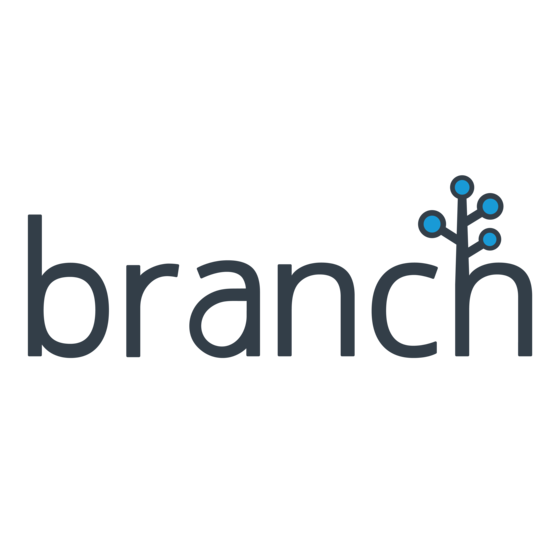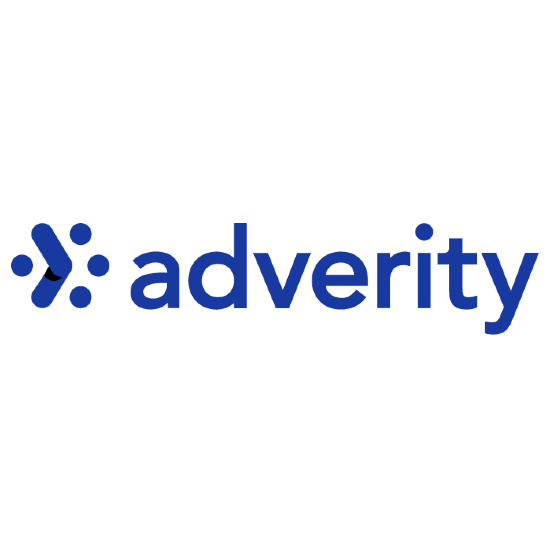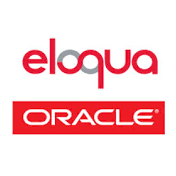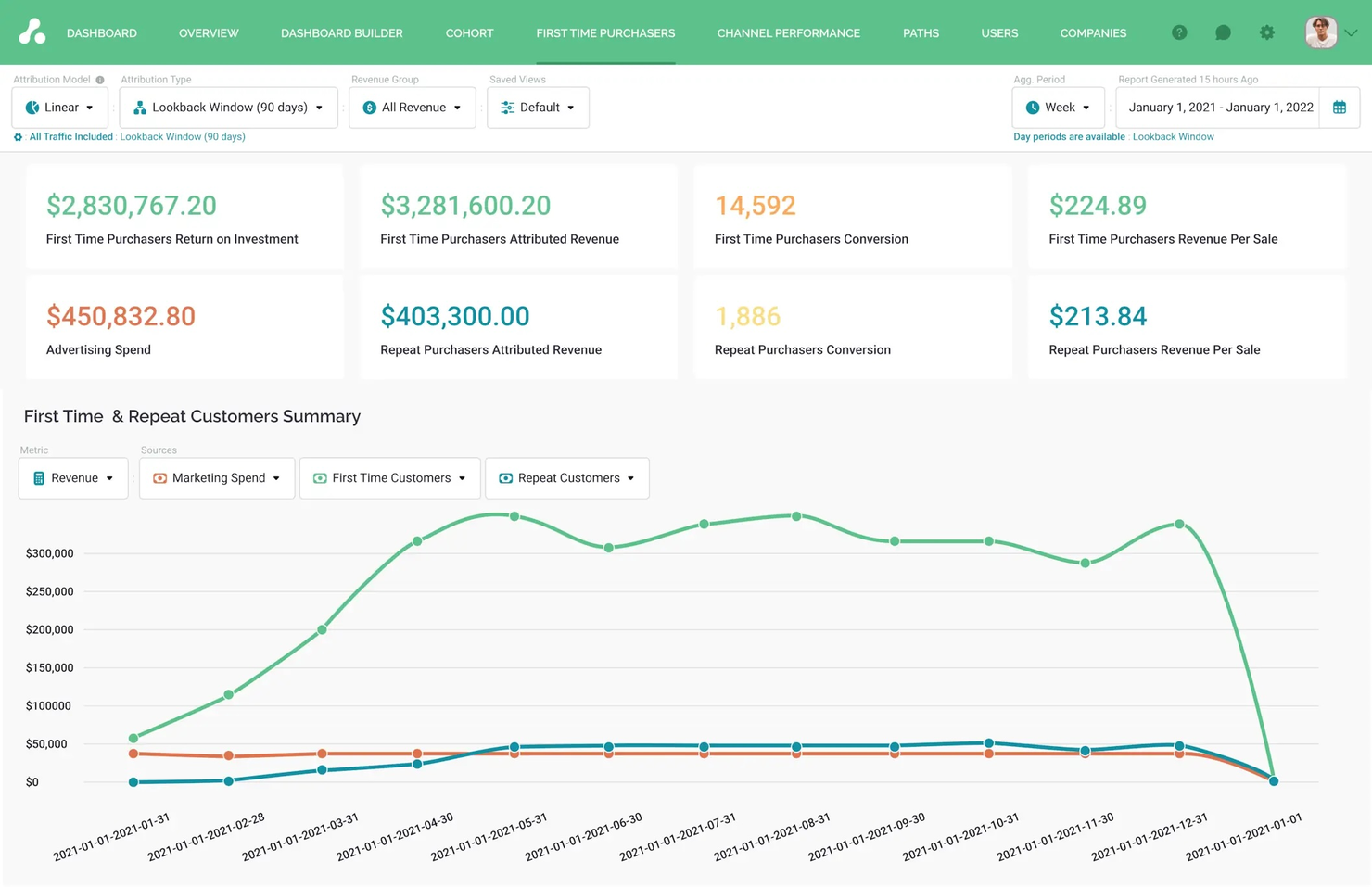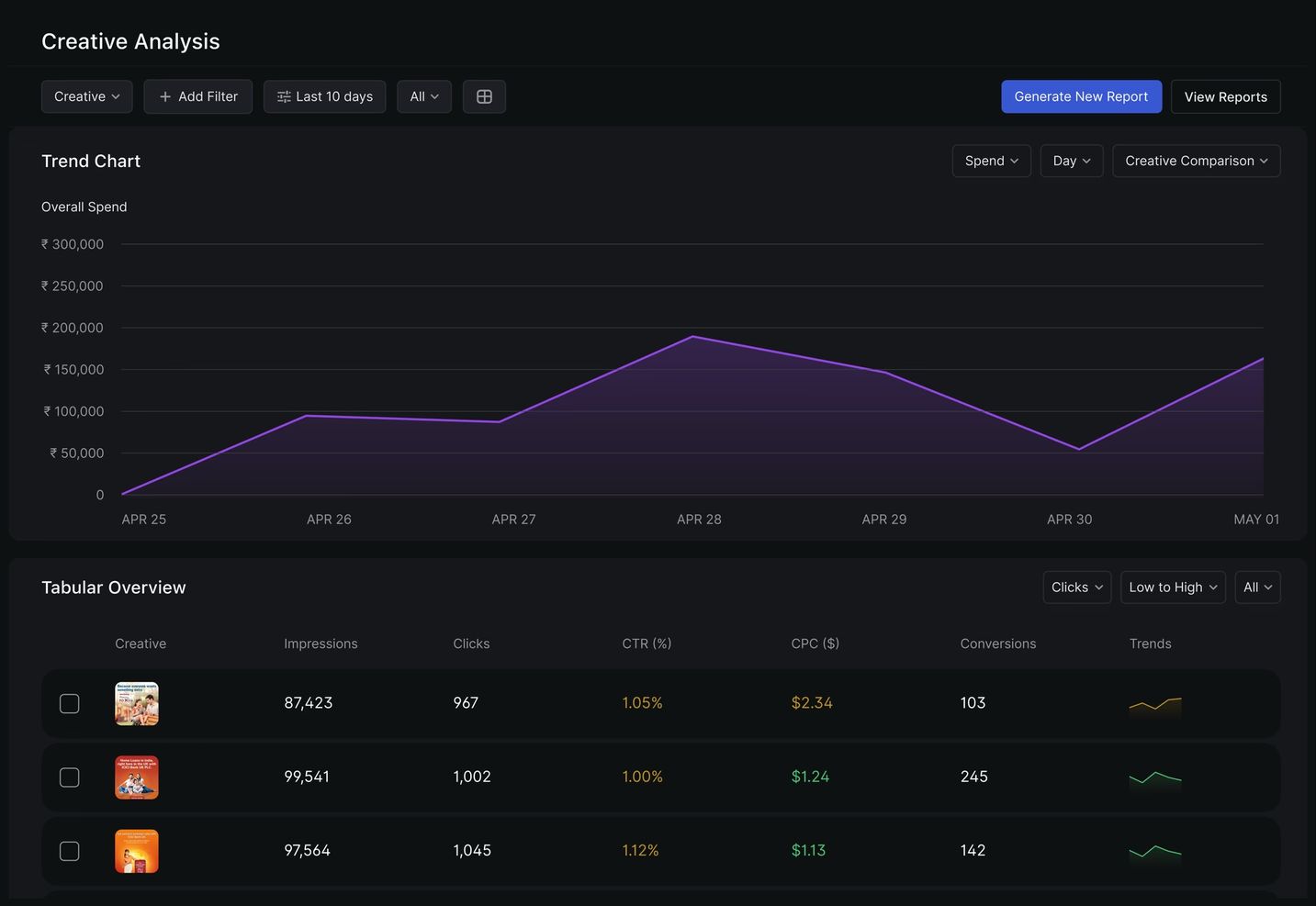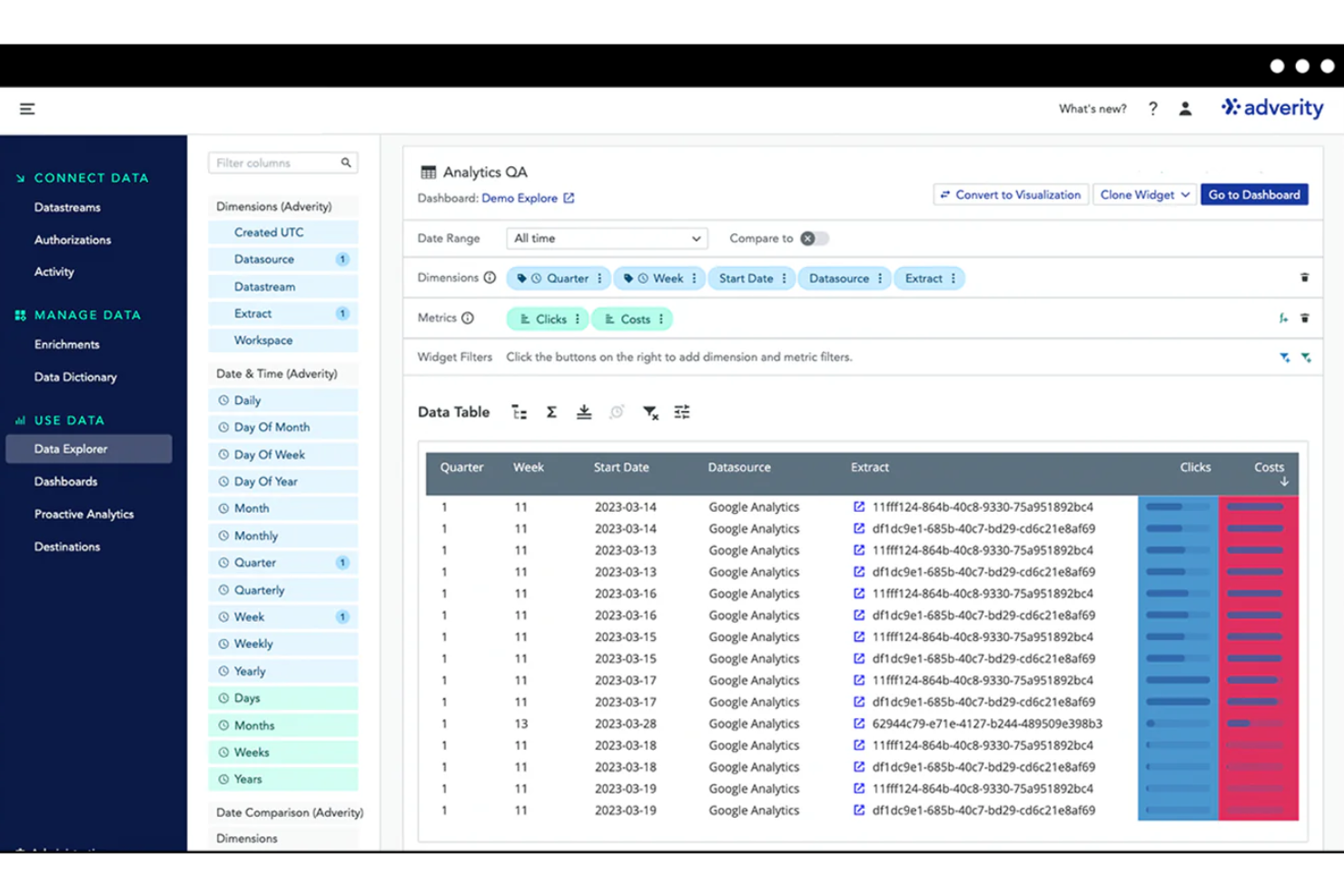20 Best Marketing Attribution Software Shortlist
Here’s my shortlist of the very best marketing attribution software along with what I found each does best:
The best marketing attribution software offer AI-powered data governance, support multiple attribution frameworks, and generate real-time reports assigning credit across the buyer's journey. Think visual dashboards, automated anomaly detection, and secure ways to share insights cross-functionally.
Yet many attribution tools contribute to decision paralysis rather than actionable insights, overwhelming teams with too many models and favouring linear customer journeys over the complex, multi-threaded paths typical in SaaS.
In my decade as a marketing leader, I’ve spent over 300 hours testing and demoing attribution platforms, evaluating how well they integrate with CRMs, how cleanly they handle UTM chaos, and how quickly they surface valuable insights.
Using our rigorous review methodology, I’ve arrived at a shortlist of the best attribution software to help you cut wasted ad spend, improve CAC efficiency, and get real-time reporting, so you can focus on growth.
Why Trust Our Reviews
We’ve been testing and reviewing marketing software since 2022. As marketing experts ourselves, we know how critical and difficult it is to make the right decision when selecting software.
We invest in deep research to help our audience make better software purchasing decisions. We’ve tested more than 2,000 tools for different marketing use cases and written over 1,000 comprehensive software reviews. Learn how we stay transparent & our software review methodology.
Table of Contents
- Best Software Shortlist
- Why Trust Us
- Compare Specs
- Best Marketing Attribution Software Reviews
- Other Marketing Attribution Software
- Related Marketing Tool Reviews
- Selection Criteria
- How to Choose Marketing Attribution Software
- Trends in Marketing Attribution Software
- What Is Marketing Attribution Software?
- Features
- Benefits
- Cost and Pricing
- Frequently Asked Questions
- Other Marketing Intelligence Software Reviews
The Best Marketing Attribution Software Summary
| Tool | Best For | Trial Info | Price | ||
|---|---|---|---|---|---|
| 1 | Best for tracking the customer journey | Free plan + demo available | From $800/month + $45/month for additional seats | Website | |
| 2 | Best for businesses with a mobile app-centric focus | 30-day free trial | Pricing upon request | Website | |
| 3 | Best for ecommerce companies | Free demo available | Free for up to 10,000 monthly active users | Website | |
| 4 | Best for startups needing versatility | Offers a limited free plan for one user/report. | From $19/month, billed annually | Website | |
| 5 | Best for companies with a focus on social media marketing | Free demo available | Pricing upon request | Website | |
| 6 | Best for agencies and large enterprise marketers | Free demo available | Pricing upon request | Website | |
| 7 | Best for real-time performance tracking | Free trial | From $49.00/month | Website | |
| 8 | Best for AI-driven product-level insights | Free demo available | Pricing starts at $350 | Website | |
| 9 | Best for real-time multi-touch attribution | Not available | Website | ||
| 10 | Perfect for businesses heavily invested in broadcast advertising | Not available | Website | ||
| 11 | Best for detailed performance tracking | Free demo available | Pricing upon request | Website | |
| 12 | Best for customer experience automation | 14-day free trial | From $20/month (billed annually) | Website | |
| 13 | Best for leveraging first-party data | Demo available | Pricing upon request | Website | |
| 14 | Best for companies seeking advanced web analytics and customer behavior insights | 30-day free trial | From $33.99/month | Website | |
| 15 | Best for businesses that want to unify their data under the Google banner | Free version | Pricing upon request | Website | |
| 16 | Best for larger organizations needing to maximize efficiency | There is no free trial. | All pricing is custom | Website | |
| 17 | Best for B2B marketers focusing on revenue analytics | Free demo available | Available upon request | Website | |
| 18 | Best for small businesses focusing on online marketing | Only a free demo is available | Starts at $199 per month for up to 50,000 users. | Website | |
| 19 | Best for cross-device tracking | Free demo available | Pricing upon request | Website | |
| 20 | Best for customizable attribution windows | Free demo available | Pricing upon request | Website |
-

Eloqua
Visit WebsiteThis is an aggregated rating for this tool including ratings from Crozdesk users and ratings from other sites.4.3 -

Optimizely
Visit WebsiteThis is an aggregated rating for this tool including ratings from Crozdesk users and ratings from other sites.4.2 -

Uberflip
Visit WebsiteThis is an aggregated rating for this tool including ratings from Crozdesk users and ratings from other sites.4.3
Best Marketing Attribution Software Reviews
Here are my picks for the best marketing attribution software, including overviews, best use cases, features, pros and cons, and pricing information.
For businesses and marketers striving to understand the impact of their marketing efforts, HubSpot offers an intuitive marketing attribution solution that provides valuable insights into how various interactions contribute to conversions. Designed for small to medium-sized businesses and marketing professionals, HubSpot's tools allow you to analyze customer interactions across multiple channels, helping you make informed decisions based on data-driven insights. By offering a range of attribution models, HubSpot assists you in optimizing your marketing strategies to enhance performance and drive growth.
Why I Picked Hubspot
I picked HubSpot for its exceptional ability to track the customer journey through its versatile attribution models. With features like multi-touch attribution and detailed revenue attribution reports, you can gain a comprehensive understanding of how each marketing effort contributes to conversions. The platform allows you to explore interaction types such as first interactions, lead creation, and closed-won stages, offering insights into the effectiveness of your strategies. By integrating marketing and sales data, HubSpot provides a unified view of the customer journey, enabling you to optimize campaigns and drive smarter growth.
Hubspot Key Features
In addition to its exceptional tracking capabilities, HubSpot offers a range of features that enhance your marketing attribution efforts.
- Contact Management: Manage and organize your contact database with ease, allowing you to segment and target specific audiences more effectively.
- Email Marketing: Create, personalize, and automate email campaigns to engage with your audience and track their interactions for better attribution insights.
- Marketing Analytics Dashboard: Access a comprehensive dashboard that provides real-time analytics and insights into your marketing performance, helping you make data-driven decisions.
- Campaign Management: Plan, execute, and monitor marketing campaigns from start to finish, ensuring that all aspects are aligned with your attribution goals.
Hubspot Integrations
Integrations include Zoom, Microsoft Teams, Slack, Salesforce, Google Chat, Shopify, LinkedIn Sales Navigator, Gmail, Google Calendar, and Outlook.
Pros and cons
Pros:
- Automation tools enhance lead generation, and marketing efficiency
- Customizable reporting dashboards to fit specific needs
- Comprehensive marketing, sales, and CRM data integrated into a single platform
Cons:
- Performance may lag with large data sets
- High pricing and setup fees can be a barrier for some businesses
AppsFlyer offers a sophisticated platform that caters to businesses seeking to elevate their marketing strategies. If you're striving to unravel the complexities of omnichannel attribution, AppsFlyer's AI-powered tools provide insights into campaign performance and customer engagement, making it ideal for industries like gaming, finance, and retail. By focusing on privacy-centric collaboration and fraud protection, AppsFlyer ensures that your marketing efforts are not only effective but also secure.
Why I Picked AppsFlyer
I picked AppsFlyer because it excels in catering to businesses with a mobile app-centric focus, offering unparalleled insights through its AI-driven analytics. The platform's ability to track user interactions across mobile, web, and CTV ensures that you can optimize campaigns and understand ROI with precision. With features like deep linking and audience segmentation, your team can enhance user engagement and retention, creating personalized experiences that resonate with your audience. Additionally, AppsFlyer's robust fraud protection safeguards your marketing budget, allowing you to focus on growth without the worry of data integrity issues.
AppsFlyer Key Features
In addition to its mobile app-centric capabilities, AppsFlyer offers a suite of features that enhance your marketing attribution efforts.
- Cohort Analysis: This feature enables you to track and analyze user behavior over time, helping you understand the long-term impact of your marketing campaigns on different user segments.
- Real-Time Data Analytics: AppsFlyer provides real-time insights into your marketing performance, allowing your team to make informed decisions quickly and adjust campaigns on the fly.
- Advanced Fraud Prevention: Protect your marketing budget with AppsFlyer's advanced fraud detection mechanisms, which identify and prevent fraudulent activities, ensuring the integrity of your data.
- Predictive Analytics: Utilize AI-driven predictive analytics to anticipate user behavior and optimize your marketing strategies for better engagement and conversion rates.
AppsFlyer Integrations
Integrations include Facebook, Google Ads, Twitter, Snapchat, TikTok, Pinterest, LinkedIn, Salesforce, Adobe Analytics, and MailChimp.
Pros and cons
Pros:
- Can track user engagement and activity in real time, offering insightful campaign data
- Includes AI-driven predictive analytics for anticipating user actions
Cons:
- Some users experience issues with customer service responsiveness
- Actual revenues can't be viewed, which can be confusing for marketers looking for long-term daily revenues
Branch is a mobile attribution platform designed to connect various marketing touchpoints, making it ideal for businesses aiming to refine their strategies and boost app growth. Whether you're in health, finance, retail, or travel, Branch provides tools for precise performance tracking, helping your team make informed decisions across paid, owned, and earned channels. With features like deep linking and cross-channel insights, Branch empowers you to optimize user journeys and improve customer engagement, effectively addressing the challenges in maximizing digital strategies.
Why I Picked Branch
I picked Branch for its exceptional ability to deliver precise marketing attribution, particularly for ecommerce companies looking to maximize their digital marketing strategies. Branch's sophisticated attribution methods allow you to track performance across paid, owned, and earned channels, providing a unified view of customer interactions. With features like advanced data feeds for customized data management and compliance solutions, the platform helps you make informed investment decisions and optimize ROI. Branch also enhances user engagement with branded short links and QR codes, ensuring seamless shopping experiences and facilitating data-driven decision-making.
Branch Key Features
In addition to its sophisticated attribution methods, Branch offers several features that can enhance your marketing attribution efforts:
- Deep Linking: This feature ensures seamless user journeys by directing users to specific content within an app, enhancing user experience and engagement.
- A/B Testing: Provides the ability to test different strategies and campaigns, allowing you to identify what works best for your audience and optimize your marketing efforts.
- Retargeting Capabilities: Enables you to re-engage users who have interacted with your app but haven't converted, increasing the chances of conversion and boosting customer retention.
- Business Intelligence Tools: Offers advanced analytics and reporting, empowering your team to make informed, data-driven decisions for your marketing strategies.
Branch Integrations
Integrations include Amplitude, Braze, MoEngage, Adjust, Adobe Analytics, AppsFlyer, Mixpanel, Segment, Singular, and TikTok Attribution Analytics.
Pros and cons
Pros:
- Accurate cross-platform attribution, enhancing user journey tracking
- Provides a cost-effective, lightweight approach to user acquisition analysis and improvement
- Versatile integration options with a wide range of platforms, enhancing data consolidation and ease of use
Cons:
- Multi-layer redirection and analytics have room for improvement
- Lacking a free trial option for potential users
For businesses aiming to elevate their marketing strategies, Windsor.ai presents a versatile platform that integrates with key data sources such as Google Analytics, Facebook Ads, and Salesforce. This tool is designed for professionals keen on deciphering the impact of their marketing channels and making informed decisions. With its actionable insights and customizable templates, Windsor.ai helps you tackle the complexity of marketing data analysis, empowering you to refine strategies and boost ROI.
Why I Picked Windsor.ai
I picked Windsor.ai for its unique ability to cater to startups needing versatility in marketing attribution. It offers an AI-driven platform integrating over 325 data sources, allowing startups to gather and analyze comprehensive marketing data without extensive technical resources. The tool's customizable attribution models and real-time reporting are essential for startups looking to refine their marketing strategies and optimize performance. Windsor.ai's affordability, starting at $19 per month, combined with its user-friendly interface, makes it an excellent choice for emerging businesses seeking to enhance their data-driven decision-making capabilities.
Windsor.ai Key Features
In addition to its versatility for startups, Windsor.ai offers a suite of features tailored to enhance your marketing attribution efforts.
- Automated Data Movement: Streamlines recurring tasks by eliminating manual data handling and ensuring seamless data flow across platforms.
- Performance Optimization: Delivers a unified view of marketing performance across channels, aiding in effective budget reallocation and strategy refinement.
- Pre-built Templates: Provides customizable templates for quick and insightful data visualization, helping you make informed decisions faster.
- Comprehensive Documentation: Offers extensive API and product documentation, ensuring your team has the support needed to maximize the tool's capabilities.
Windsor.ai Integrations
Integrations include Facebook Ads, Google Analytics 4, Google Ads, Salesforce, Shopify, Looker Studio, Power BI, BigQuery, Google Sheets, and ChatGPT.
Pros and cons
Pros:
- Enhances visibility into expenditures on digital media along with single and multi-channel attribution
- Features a no-code interface, making it accessible for non-tech users
- Exceptional customer service and support
Cons:
- May encounter performance issues with large data volumes, especially on mobile
- Limited advanced features may not satisfy technical users
Oktopost is an incredibly powerful and user-friendly social media monitoring and analysis tool for B2B marketers. It offers in-depth insights into your viewers' behavior using AI-powered algorithms.
This makes it simple for marketers to gauge the success of their initiatives and operations and monitor changes over time.
Why I picked Oktopost: The platform has an incredible ability to track the impact of social media on lead generation and conversions. Plus, it has the ability to offer suggestions for enhancing social media visibility and optimizing engagement.
Oktopost Standout Features and Integrations
Features: Oktopost is a marketing attribution solution you might want to test because of its cutting-edge customer engagement, sentiment and trend analysis, audience targeting, predictive analytics, and influencer monitoring features.
Integrations: Canva, WordPress, Google Analytics 360, Microsoft Teams, HubSpot Marketing Hub, Dynamics 365, Zapier, and of course, many others.
Pros and cons
Pros:
- Personalized content curation based on platform and audience.
- Ideal for social media managers needing productivity boost and real-time post analytics.
- Streamlines daily social media management with performance metrics monitoring.
Cons:
- Lack of free trial may deter potential users.
- Requires leaderboard segmentation based on social campaigns.
LeadsRX is an insightful marketing attribution solution that offers a comprehensive view of the customer journey. Its Universal Conversion Tracking ‘Pixel’ allows marketers to optimize campaigns and budgets in real-time, significantly improving ROAS.
Why I picked LeadsRX: I was captivated by LeadsRX's capacity to transcend traditional digital analytics. Its Universal Conversion Tracking Pixel™ provides complete online and offline channel coverage, a rarity in the field, making it a potential game-changer for businesses with diverse advertising strategies.
Standout Features and Integrations
Features: LeadsRX's cross-domain, cross-device tracking feature is remarkable, offering a comprehensive view of customer journeys, including offline channels—a rarity in this domain.
Integrations: For a complete list of integrations, I recommend contacting LeadsRX directly. However, they mention Salesforce, Optimizely, HubSpot, and CallRail among their partnerships.
Pros and cons
Pros:
- Their data insights provide a fair evaluation of marketing strategies' effectiveness.
- Real-time insights enable nimble campaign adjustments.
- LeadsRX's Universal Conversion Tracking Pixel™ delivers a holistic view of customer journeys.
Cons:
- The lack of a free trial could deter users wanting to sample the platform before purchase.
- The absence of visible pricing details on the website may inconvenience some.
Neustar offers a sophisticated marketing attribution platform tailored to enterprise-level brands. Neustar helps you allocate your marketing budget more effectively, ensuring that every dollar spent contributes to achieving your business objectives.
Why I Picked Neustar
I picked Neustar for its unique ability to integrate multi-touch attribution models with real-time performance tracking, making it a standout choice for marketing attribution. With features like AI-driven media optimization, you can plan scenarios that enhance media efficiency. Its cross-channel dashboard provides a centralized view of media measurement, allowing you to track and optimize campaigns across various platforms. This makes Neustar a valuable tool for any marketing team aiming to refine their strategies and maximize ROI.
Neustar Key Features
In addition to its strong attribution capabilities, Neustar offers several other features that can benefit your marketing team:
- Incrementality Testing: Automates experiments to measure the true effectiveness of your marketing efforts.
- Competitive Insights: Provides benchmarking to help identify growth opportunities in your market.
- Data Integration: Seamlessly integrates with over 300 systems, ensuring you have a comprehensive view of your marketing data.
- Consulting Services: Offers expert guidance to help you interpret and leverage your marketing data effectively.
Neustar Integrations
Integrations include Neustar PlatformOne Data Management Platform, Facebook, Google Analytics, Salesforce, Adobe Analytics, Oracle BlueKai, Amazon Web Services, Microsoft Azure, Tableau, and IBM Watson.
Pros and cons
Pros:
- robust integration capabilities
- comprehensive data analytics
- accurate customer journey tracking
Cons:
- some users dislike the interface
- can be complex to set up
For marketers seeking to unlock the potential of their data, Adinton offers an AI-driven infrastructure tailored to optimize your marketing strategies. Adinton's marketing attribution software offers a comprehensive set of features that make it a strong contender in the marketing attribution space, especially for e-commerce businesses.
Why I picked Adinton:
For marketers seeking to unlock the potential of their data, Adinton offers an AI-driven infrastructure tailored to optimize your marketing strategies. Whether you're part of a performance team or an agency looking to enhance your product-level insights, Adinton helps you track, attribute, and predict with precision. By integrating seamlessly with tools like BigQuery and Power BI, it addresses the challenge of understanding what truly drives revenue without the hassle of complicated tech stacks.
Adinton Key Features:
In addition to its core multi-touch attribution capabilities, I also found several features that enhance its value:
- Seamless Integration: Adinton provides seamless integration with BigQuery, enabling advanced data analysis and visualization.
- Real-time Processing: Adinton offers real-time API sync with server-side tracking.
- Powerful Integrations: Looker Studio and Power BI ready, allowing your team to use familiar tools for data visualization.
- Predictive AI Modeling: Predictive AI modeling helps you forecast performance and optimize campaigns effectively.
Integrations:
Adinton offers native integrations with platforms such as Pipedrive, Zapier, Tarvent, Whippy AI, Nekton.ai, Wufoo, and Plumsail Documents.
Pros and cons
Pros:
- advanced data analytics and visualization
- real-time API sync
- AI-driven product insights
Cons:
- some integration challenges
- some users find platform complex
Attribution App offers a comprehensive solution tailored to track an optimize every touchpoint in the customer journey. Appealing to B2B, SaaS, and E-Commerce teams enables users to analyze metrics such as Customer Acquisition Cost (CAC) and Lifetime Value (LTV). Attribution App addresses the challenge of optimizing marketing budgets and strategies, making it an invaluable tool for those aiming to maximize their return on investment.
Why I Picked Attribution App
I picked Attribution App because it excels in providing real-time, auditable multi-touch attribution capabilities, which are crucial for understanding the full impact of marketing efforts. The software's ability to track user interactions and spending from acquisition to retention allows teams to link marketing activities directly to key financial metrics like CAC and LTV. Additionally, its seamless integration with popular platforms such as Shopify and HubSpot ensures that you can easily access and leverage data without needing extensive technical resources. These features make it a strong choice for businesses aiming to optimize their marketing strategies.
Attribution App Key Features
In addition to its core multi-touch attribution capabilities, I also found several features that enhance its value:
- Channel Experimentation: Allows you to test and optimize new marketing channels without disrupting existing sales cycles.
- Customizable Attribution Models: Provides flexibility to tailor attribution models to fit specific business needs, ensuring more accurate insights.
- Customer Journey Mapping: Offers detailed tracking of customer interactions, helping you understand and improve conversion rates.
- Performance Tracking and Reporting: Delivers real-time reports on marketing performance, enabling data-driven decision-making.
Attribution App Integrations
Integrations include Shopify, HubSpot, Salesforce, Marketo, Google Ads, Facebook Ads, LinkedIn Ads, Twitter Ads, Bing Ads, and Twilio.
Pros and cons
Pros:
- performance tracking and reporting
- detailed tracking of CAC and customer LTV
- real-time, multi-touch attribution
Cons:
- steep learning curve for some users
- lacking advanced features
Altitude by Impact is part of Impact's partnership management platform, which focuses on optimizing affiliate, influencer, and referral marketing. It offers analytics and attribution tools that help businesses measure the success of their partnerships and marketing efforts.
Why I Picked Altitude by Impact
I picked Altitude by Impact because it offers detailed performance tracking, allowing you to see which partnerships are driving actual sales rather than just traffic. This feature is crucial in marketing attribution as it helps you allocate your resources more effectively. Additionally, the platform's ability to manage customer referrals turns satisfied customers into a measurable revenue channel, providing a clear view of your marketing impact.
Another reason for choosing Altitude by Impact is its robust analytics and attribution capabilities. These tools allow you to predict performance and assess partner value, which is essential for refining your marketing strategies. The platform also emphasizes brand safety, offering features like quick resolution of keyword violations and protection against promo code misuse, ensuring that your marketing efforts are not only effective but also secure.
Standout Features
Features include tools for partner discovery, which help you find the right affiliates and influencers to align with your brand. The platform also offers campaign optimization capabilities, allowing you to fine-tune your marketing efforts for better results. Lastly, its brand safety features ensure that your partnerships are protected against fraudulent activities, giving you peace of mind as you expand your marketing reach.
Integrations
I was not able to source a list of integrations on the official Impact website.
Pros and cons
Pros:
- Accurate tracking and reporting
- Comprehensive analytics
- Strong brand safety measures
Cons:
- Can be expensive
- Complex set-up for large organizations
ActiveCampaign excels in the world of marketing attribution software, providing customer experience automation that truly makes a difference. By evaluating touchpoints, quantifying ROI, and monitoring conversions, this powerful platform refines your marketing campaigns. The company is a reliable partner when you need attribution, conversion, and automation. It also offers a significant impact on your customer engagement.
Why I picked ActiveCampaign: I chose ActiveCampaign for its superior automation and advanced tracking features. It excels in using machine learning and multi-touch attribution for precise evaluation of marketing strategies' effectiveness.
ActiveCampaign Standout Features and Integrations
Features: The platform shines with features like multi-channel touchpoints, conversion tracking, ROI analysis, dynamic content, A/B testing, and site messaging. Its predictive content and machine learning capabilities are also noteworthy.
Integrations: It boasts seamless integrations with platforms such as Shopify, Salesforce, WordPress, Zapier, Facebook, and ClickFunnels, constantly updating its list to stay relevant.
Pros and cons
Pros:
- It provides comprehensive reporting and analytics tools.
- Boasts an easy-to-use interface with seamless third-party app integration.
- It facilitates crafting of personalized, targeted campaigns.
Cons:
- There's a learning curve to fully utilize the platform.
- Pricing might be a concern for small businesses or budget-conscious marketers.
For marketers aiming to refine their marketing attribution, Hawky.ai provides a blend of creative intelligence and real-time insights. This AI-driven platform is designed for businesses focused on maximizing ROI by analyzing ad effectiveness and optimizing creative content. By integrating data from multiple platforms and offering actionable insights, Hawky.ai tackles challenges like ad spend waste and campaign strategy refinement, serving as a key tool for performance marketers in the digital landscape.
Why I Picked Hawky.ai
I picked Hawky.ai for its unique focus on leveraging first-party data, crucial in today's privacy-first environment for enhancing marketing attribution. Its Incremental Attribution Model accurately measures ad impact, reducing over-reporting and optimizing budget allocation. I appreciate its ability to integrate first-party data with tools like Meta's Pixel and Conversions API for comprehensive data capture and audience targeting. Additionally, Hawky.ai's cross-channel integration ensures a seamless omnichannel experience, making it an ideal choice for marketers aiming to optimize their campaigns with precision and transparency.
Hawky.ai Key Features
In addition to its focus on leveraging first-party data for accurate marketing attribution, Hawky.ai offers several key features that enhance its utility for marketers.
- Creative Analysis: Hawky.ai provides insights into the performance of individual ad elements, helping you identify which components drive engagement and conversions.
- Competitor Analysis: The platform offers detailed insights into competitor strategies, allowing you to benchmark your campaigns against industry leaders and uncover opportunities for improvement.
- AI Creative Generation: With its AI-powered tools, you can quickly generate new ad creatives that align with proven patterns and competitor data, streamlining the creative process.
- Unified Dashboard: By integrating data from platforms like Meta, Google, and TikTok, Hawky.ai presents a comprehensive view of your marketing performance, enabling informed decision-making across all channels.
Hawky.ai Integrations
Integrations include Meta, LinkedIn, Google Ads, Google Analytics, AppsFlyer, Salesforce, Leadsquared, Zoho CRM, Slack, and Google Sheets.
Best for companies seeking advanced web analytics and customer behavior insights
With a wide range of attribution models, including algorithmic attribution powered by advanced machine learning, Adobe Analytics is the ultimate tool for advanced web analytics and customer behavior insights.
Why I picked Adobe Analytics: Adobe Analytics impressed me with its deep data analysis capabilities, revealing hidden patterns and highlighting statistical anomalies. It effectively uncovers correlations underlying unexpected customer behavior, unusual data points, and sudden shifts in metrics across different audience segments.
Adobe Analytics: Standout Features and Integrations
Features: Adobe's data warehouse provides sophisticated data storage, reprocessing capabilities, and extensive reporting tools. Additionally, its data feeds offer regular batch delivery of raw, insightful data.
Integrations: Adobe Analytics integrates with renowned platforms including Adobe's own suite, Hootsuite, Invoca, Branch.io, and BrightEdge.
Pros and cons
Pros:
- The persistent IDs ensure consistent and reliable data attribution over time, enhancing the accuracy of your insights.
- Provides detailed channel and marketing analytics for deeper understanding of user interactions.
- Empowers decision-making through predictive analytics.
Cons:
- Lack of free trial may deter prospective users from experiencing the platform's capabilities firsthand.
- Initial steep learning curve may be challenging for non-tech-savvy users.
Best for businesses that want to unify their data under the Google banner
As a part of the world's most widely used analytics platform, it's a no-brainer for businesses that want to simplify their data analysis and decision-making process.
With Attribution 360, you can quickly combine cross-channel data from sources like IoT, digital point-of-sale systems, and CRM software thanks to native connectivity to your Google performance and advertising data.
Why I picked Google Attribution 360: Being part of Google Analytics 360 Suite, Google Attribution 360 offers an integrated set of marketing optimization tools, an all-in-one solution for businesses desiring to streamline their analytics.
Google Attribution 360 Standout Features and Integrations
Features: Attribution 360 boasts unique features like Marketing Mix Modeling for offline and digital channels. It provides insights on external factors and even evaluates television ads' impact.
Integrations: Attribution 360 integrates with native Google products, Salesforce, Campaign Monitor, Sprout Social, Wix, Semrush, and Mailchimp.
Pros and cons
Pros:
- Direct integration with other Google products provides a seamless experience.
- Detailed insights into website user behaviors.
- Easy installation and understanding.
Cons:
- Limited customization options compared to some competitors.
- Paid features can be aggressively priced.
As an avid digital marketer, I'm always on the hunt for the best tools to optimize my efforts. C3 Metrics is a marketing attribution powerhouse, perfect for large organizations across sectors like D2C, ecommerce, Financial Services, and more.
Why I picked C3 Metrics: C3 Metrics shines in handling complex ad portfolios for businesses with over $6 million in annual media budgets. Its multi-touch attribution (MTA) approach is excellent for organizations across multiple channels.
C3 Metrics Standout Features and Integrations
Features: C3 Metrics excels in quality control and conversion tracking, turning raw information into digestible analytics. Its Attribution Data Cloud allows effortless data filtering, categorizing, and modeling.
Integrations: Interestingly, the company doesn’t list the various platforms it integrates with on its website. However, as an attribution modeling and data analytics platform, C3 Metrics aims to provide a comprehensive view of marketing performance and the customer journey.
Pros and cons
Pros:
- C3 Metrics' focus on handling complex ad portfolios makes it ideal for large businesses operating across multiple channels.
- Its unique client-centric tagging infrastructure ensures high-level privacy.
- Exceptional product knowledge and adaptability to diverse client-specific use cases.
Cons:
- It may be challenging for businesses to assess its compatibility with their existing tech stack.
- High-end solutions might not be affordable for small businesses and startups.
As a B2B marketer, you understand that tracking and attributing revenue to specific marketing activities is crucial. But it's problematic - there are countless touchpoints involved in the B2B buying process, and it can take weeks upon weeks to see the results of your efforts. That's where Dreamdata comes in.
Why I picked Dreamdata: I chose Dreamdata for its comprehensive client journey view, thanks to its ability to collect, join, and model relevant B2B data. It's built exclusively for B2B marketers, catering to their specific requirements.
Dreamdata Standout Features and Integrations
Features: Dreamdata's standout attribute is its machine learning algorithm-based attribution. It analyzes every customer journey touchpoint, providing a more accurate credit assignment.
Integrations: HubSpot, Zoho CRM, Pipedrive, Microsoft Dynamics, Salesforce, and Zendesk all integrate with Dreamdata, along with many others.
Pros and cons
Pros:
- Dedicated expert team committed to ensuring maximum tool utility.
- Offers insightful, actionable reporting beyond basic metrics.
- Provides a deep, account-level view for enhanced marketing performance insights.
Cons:
- The abundance of features, data, and analyses can be confusing for beginners.
- Initial tool use may be overwhelming due to complexity.
Ruler Analytics is a powerful tool that focuses on providing you with insightful data and accurate multi-touch attribution, allowing you to make informed decisions and upgrade your marketing efforts.
Why I picked Ruler Analytics: I must admit, Ruler Analytics has truly impressed me as a top-tier marketing attribution software for small businesses emphasizing online marketing. Its unique ability to track static and offline calls provides invaluable insights into caller journeys.
Ruler Analytics Standout Features and Integrations
Features: Ruler Analytics excels in managing leads and channels, offering ROI emphasis, visitor tracking, and data-driven marketing decisions.
Integrations: It integrates smoothly with HubSpot, Mailchimp, Zoho CRM, Google Ads, and Marketo, enabling a comprehensive view of your marketing efforts.
Pros and cons
Pros:
- Unique ability to track and analyze both static and offline calls, providing valuable insights
- You can match multiple clicks to both form submissions and phone calls.
- The ability to track both form submissions and online chat interactions.
Cons:
- It can be challenging to track how performance has gotten better over a certain period of time.
- It’s possible some users may be intimidated by the number of features the software boasts.
impact.com is a partnership management platform that helps businesses manage and optimize various types of partnerships, including affiliates, influencers, and strategic business partners. It offers tools to automate the entire partnership lifecycle, from discovery and recruitment to tracking and optimization.
Why I picked impact.com: One reason I like impact.com is its cross-device tracking capabilities. This feature lets you monitor customer interactions across multiple devices, providing a comprehensive view of their journey. You can also customize attribution models to fit your business needs, moving beyond traditional "black box" models. This flexibility allows you to evaluate the effectiveness of different marketing channels and strategies, ensuring your marketing spend is optimized for the best return on investment.
impact.com Standout Features and Integrations
Features: impact.com offers other features such as event-level data normalization, real-time data capture, de-duplication of touchpoint data, customer journey analysis, incrementality analysis, causality understanding, offline and digital performance bridging, and proprietary identity matching.
Integrations: Shopify, BigCommerce, HubSpot, Adobe Commerce (Magento), AppsFlyer, Adjust, AnyTrack, Branch, mParticle, Segments, Google Analytics, and Salesforce.
Pros and cons
Pros:
- Fraud detection capabilities
- Supports the entire partnership lifecycle
- Comprehensive reporting features
Cons:
- Occasional delays in payment processing
- May take time to set up the platform
For those seeking a marketing attribution solution that transcends traditional data reporting, Adverity presents an AI-powered platform that transforms your raw data into insightful narratives. This tool is particularly appealing to data-driven marketing teams and agencies, providing integration with over 600 data connectors, including major platforms like Google and Meta. By automating data collection and management, Adverity allows you to focus on strategic decision-making, eliminating the tedious task of manual data wrangling and ensuring you have accurate, real-time insights to drive your marketing strategies forward.
Why I Picked Adverity
I picked Adverity for its unique ability to offer customizable attribution windows, a feature that sets it apart in the marketing attribution software landscape. This functionality allows you to define the timeframe between ad interactions and resulting actions, enhancing your ability to track marketing performance accurately. With AI-powered data governance, Adverity supports various attribution models and offers real-time reporting, enabling you to optimize your marketing strategies by reducing wasted ad spend and improving customer acquisition costs. The platform's capability for data harmonization and integration with major platforms further strengthens its position as a top choice for marketers seeking precision and flexibility in their attribution analysis.
Adverity Key Features
In addition to customizable attribution windows, Adverity offers a suite of features that enhance your marketing attribution capabilities:
- Data Integration & Connectivity: Connects various data sources to provide a centralized view of performance, eliminating data silos.
- Automation & Efficiency: Automates data collection and analysis, reducing manual reporting time and errors.
- Real-Time Insights & Dashboards: Provides access to real-time analytics and customizable dashboards, allowing you to monitor campaign performance and make timely adjustments.
- AI & Predictive Analytics: Utilizes AI to forecast trends and customer behavior, optimizing budget allocations.
Adverity Integrations
Integrations include Google, Meta, TikTok, Amazon Ads, Quickbooks, Google BigQuery, Looker Studio, and custom data connectors through APIs and SFTP.
Pros and cons
Pros:
- Extensive data connectivity with over 600 API integrations
- Automated data harmonization facilitates comparison across multiple sources
- AI-powered data governance maintains data integrity
Cons:
- Limited built-in visualization compared to dedicated BI tools
- Platform complexity may not suit businesses without data expertise
Other Marketing Attribution Software
You’re under pressure to prove marketing’s impact but attribution is a mess of conflicting data, channel silos, and inflated vendor promises. The right marketing attribution software can change that by helping you track ROI accurately, optimize spend across touchpoints, and make a bulletproof case for next year’s budget. I’ve used my decade long experience and our proprietary software to find the best marketing attribution tools so you can stop chasing dashboards and get back to what actually matters: running marketing campaigns that move the needle.
Though they didn’t make the top spot, there are other marketing attribution platforms that excel in specific scenarios and could be a perfect fit for certain business types.
Related Marketing Tool Reviews
If you still haven't found what you're looking for here, check out these tools closely related to digital marketing strategy that we've tested and evaluated.
- Marketing Software
- Marketing Management Software
- Account Based Marketing Software
- Social Media Management Software
- Email Marketing Software
Selection Criteria For Marketing Attribution Software
Selecting the right marketing attribution software involves a careful evaluation of what each one has to offer. Through extensive personal trials spanning nearly a decade and lots of additional research, I've developed criteria to guide you in making an informed decision.
Core Functionality: 25%
Marketing attribution software must excel in a few core areas that are critical to nearly all marketing teams:
- Accurate tracking of customer interactions across multiple channels and touchpoints.
- Comprehensive analysis of the customer journey to determine which marketing efforts are driving conversions.
- Real-time reporting capabilities to enable agile marketing decisions.
- Integration with other marketing tools and platforms for seamless data flow and insights.
- Attribution modeling flexibility to align with different business models and marketing strategies.
Additional Standout Features: 25%
To differentiate among options, I look for unique features that elevate a tool above its peers:
- Advanced machine learning algorithms for predictive analytics, helping anticipate future customer behaviors based on historical data.
- Cross-device tracking capabilities to provide a holistic view of the customer journey, regardless of the device used.
- Custom attribution models that allow marketers to tailor the attribution to the nuances of their specific industry or business model.
- Examples include tools that offer unique visualization tools for mapping the customer journey or innovative approaches to handling data privacy concerns.
Usability: 10%
A balance between powerful functionality and user-friendliness is crucial:
- Intuitive dashboards that present data in an easily digestible format, enabling quick insights at a glance.
- A clean, user-friendly interface that simplifies complex data analysis, making it accessible to users regardless of their technical expertise.
Onboarding: 10%
Efficient onboarding processes are essential for swift adoption and realization of value:
- Comprehensive training materials, such as videos, templates, and product tours, to facilitate a smooth learning curve.
- Interactive assistance, like chatbots or dedicated account managers, to provide support during the initial setup and customization.
Customer Support: 10%
Exceptional customer support distinguishes the best tools in this category:
- Responsive and knowledgeable support teams available across multiple channels (email, phone, live chat).
- A robust knowledge base with detailed documentation, FAQs, and community forums for self-service troubleshooting.
Value For Money: 10%
Assessing whether a tool offers a strong return on investment is key:
- Competitive pricing structures that align with the features and benefits provided.
- Flexible pricing plans that accommodate businesses of various sizes and scales.
Customer Reviews: 10%
Customer testimonials and reviews offer invaluable insights into real-world usage:
- High satisfaction ratings across diverse industries and business sizes.
- Positive feedback on specific features like the tool’s analytics precision, ease of use, and customer support responsiveness.
When choosing marketing attribution software, it’s imperative to consider a blend of core functionalities, unique features, usability, onboarding ease, customer support quality, value for money, and positive customer reviews.
How to Choose Marketing Attribution Software
When looking to select marketing attribution software, it's important that you approach the decision with a firm eye on your business goals and context. Here’s a checklist I like to use that balances general software selection principles with specific considerations for marketing attribution software:
- Determine Your Business Needs and Goals: What attribution problems are you aiming to solve and how will your preferred software solve these issues? How does solving these issues support your business objectives? Answering these questions is the first step towards picking the right marketing attribution software.
- Evaluate Software Features and Integration Capabilities: What are the must-have features? Will your chosen attribution platform integrate with your current martech stack seamlessly or will you need to make adjustments for that to happen? Will these adjustments mean you need to increase your budget? How does that change your ROI calculations?
- Assess Scalability and Flexibility: How scalable is the marketing attribution software? Is it able to accommodate any change in needs or business context on the fly? Can you integrate a diverse range of data sources and formats?
- Consider the Total Cost of Ownership (TCO): Have you accounted for all costs? This includes the cost of implementation, training, support, and possible hardware and software upgrades. Can you afford the support and training costs down the line? Support and training are key to due to the complexity of most marketing attribution software.
- Review Security, Compliance, and Privacy: In a world where you could get into serious trouble for a data breach, data privacy and compliance are indispensable features. Does the software have strict data security protocols built in? Do they comply with regulations like GDPR?
These questions are a start. However, depending on your context you might have other questions to add.
Trends in Marketing Attribution Software
Here are some trends I’ve noticed for marketing attribution software these days, plus what they might mean for the future of the marketing industry. I like to keep up with all kinds of product updates, press releases, and release logs to tease out the most important insights.
Integrated Multi-Touch Attribution Models
There's a significant push towards more integrated multi-touch attribution (MTA) models, stemming from the need to analyze consumer interactions across multiple channels and touchpoints more accurately, providing a holistic view of the customer journey.
Tools like Adobe Analytics and Google Analytics have introduced enhanced MTA capabilities, focusing on AI-driven models to allocate credit more accurately across touchpoints. This trend addresses the challenge of fragmented customer journeys, enabling marketers to pinpoint the impact of each marketing effort with greater precision.
Predictive Analytics and AI
Predictive analytics and AI are becoming central to marketing attribution software, enabling predictive modeling of customer behavior and sales conversions. HubSpot has heavily invested in AI functionalities, incorporating predictive analytics that forecast future consumer actions based on historical data. This addresses the need to anticipate customer behavior, allowing for more strategic planning and targeting in marketing efforts.
Privacy-Focused Tracking
With increasing concerns over privacy and data protection, there's a noticeable pivot towards privacy-focused tracking methods. Platforms are adopting first-party data strategies and privacy-compliant tracking technologies, as seen in recent updates from Tealium and Segment. This trend is a response to the growing demand for data privacy, ensuring compliance with regulations like GDPR and CCPA while still gathering meaningful insights.
Decline in Cookie-Dependent Tracking
There's a marked decrease in the importance of cookie-dependent tracking mechanisms, propelled by privacy regulations and the phasing out of third-party cookies. The diminishing reliance on cookies is evident from the development of alternative tracking technologies and methods that focus on first-party data and contextual targeting. This shift reflects the industry's adaptation to a changing regulatory environment and the need for more sustainable, privacy-respecting tracking methods.
These trends underscore the industry's commitment to addressing the complex challenges faced by marketing professionals, ensuring they have the tools necessary to navigate the digital landscape effectively.
What Is Marketing Attribution Software?
Marketing attribution software is a tool that tracks and analyzes the impact of various marketing activities on customer behavior and sales. The purpose is to:
- Identify the marketing channels and tactics that lead to conversions
- Understand and optimize the customer journey
- Optimize spend and minimize costs
- Prove ROI
Features of Marketing Attribution Software
These are the key features I evaluate when I am looking at marketing attribution software.
- Multi-Channel Tracking: This feature enables businesses to track customer interactions across various channels, including digital (like social media, email, and PPC) and offline channels (such as events and call centers), providing a comprehensive view of the customer journey.
- Attribution Modeling: The software offers different models (such as first-touch, last-touch, linear, time decay, and algorithmic) to attribute credit to various marketing touchpoints. This helps in understanding the impact of each channel and campaign on the final conversion.
- Integration Capabilities: Effective marketing attribution software integrates seamlessly with other tools and platforms, such as CRM systems, marketing automation software, and analytics tools, to gather and analyze data from various sources.
- Cross-Device Tracking: With customers using multiple devices (smartphones, tablets, laptops) to interact with brands, cross-device tracking is essential for accurate attribution, ensuring that the customer journey is tracked seamlessly across devices.
- Real-Time Analytics and Reporting: The ability to access real-time data and generate detailed reports is vital for timely decision-making. This feature allows marketers to quickly assess campaign performance and make adjustments as needed.
- User Journey Visualization: Visualization tools within the software help in mapping out the entire customer journey, highlighting key touchpoints and interactions that led to conversion. This makes it easier to understand complex paths to purchase.
- ROI Measurement: Marketing attribution software measures the return on investment (ROI) for different marketing initiatives, providing insights into which campaigns are generating value and which are not. This helps in optimizing marketing spend for better returns.
- Customizable Attribution Windows: The software allows businesses to set custom attribution windows, which is the timeframe in which a touchpoint is considered to have influenced a conversion. This is crucial for businesses with longer or shorter sales cycles.
- Fraud Detection: Some solutions include features to detect and filter out fraudulent activities, ensuring that the attribution data is accurate and reliable.
- Collaboration and Sharing Features: The ability for teams to collaborate on the platform and easily share reports and insights with stakeholders is important for strategic planning and execution.
By leveraging these features, businesses can gain a deeper understanding of their marketing performance, enabling them to make data-driven decisions and optimize their marketing strategies for maximum impact.
Benefits of Marketing Attribution Software
Marketing attribution software is an essential tool for those looking to optimize their marketing strategies and improve their return on investment. And really, aren't we all trying to do that, always? Here are five primary benefits of using marketing attribution software for users and organizations:
- Improved Marketing ROI: By pinpointing which marketing channels and campaigns are generating the most revenue, users can allocate their budgets more effectively, leading to a higher return on investment. This precision in spending ensures that marketing dollars are invested in areas with the highest impact.
- Enhanced Campaign Optimization: Marketing attribution software provides detailed insights into campaign performance across all channels. This enables marketers to fine-tune their campaigns in real-time, maximizing effectiveness and efficiency.
- Better Customer Insights: The software offers a deep understanding of the customer journey, highlighting which touchpoints and interactions are most influential in driving conversions. This knowledge allows businesses to tailor their marketing strategies to better meet customer needs and preferences.
- Increased Marketing Agility: With real-time data and analytics, organizations can quickly adjust their marketing strategies in response to performance data or market changes. This agility ensures that marketing efforts remain relevant and effective, even in dynamic market conditions.
- Strategic Decision Making: By providing a comprehensive view of the marketing landscape and the effectiveness of various campaigns and channels, marketing attribution software supports data-driven strategic decisions. This leads to more targeted and successful marketing initiatives.
By making it possible to accurately measure and analyze the effectiveness of each marketing touchpoint, businesses can optimize their strategies, improve their ROI, and ultimately drive more successful outcomes.
Cost & Pricing for Marketing Attribution Software
When exploring your options in marketing attribution software, it's really helpful to understand the various plan and pricing options available. The right plan for your organization will depend on several factors, including the size of your business, the complexity of your marketing efforts, and the specific features you need.
Plan Comparison Table for Marketing Attribution Software
| Plan Type | Average Price | Common Features |
|---|---|---|
| Starter | $100 - $500/month | Basic attribution models, multi-channel tracking, standard reporting, and email support. |
| Professional | $500 - $1,500/month | Advanced attribution models, cross-device tracking, integration capabilities, real-time analytics, and phone support. |
| Enterprise | $1,500+/month | Custom attribution models, API access, dedicated account manager, custom integrations, and strategic consulting services. |
| Free | $0 | Limited attribution models, basic multi-channel tracking, and community support. |
Selecting the right plan involves balancing the depth of insights you require with your available budget. Always consider your organization's specific requirements and growth potential when choosing a plan to ensure that the software can scale with your business.
New & Noteworthy Product Updates
Here are some key product updates for marketing attribution software products that users and software buyers should be aware of this quarter. Learn what’s new, if it’s hot—or not, and why each major change matters for marketing experts.
April 2024 Updates
Here are some April update highlights.
ActiveCampaign Update Notes
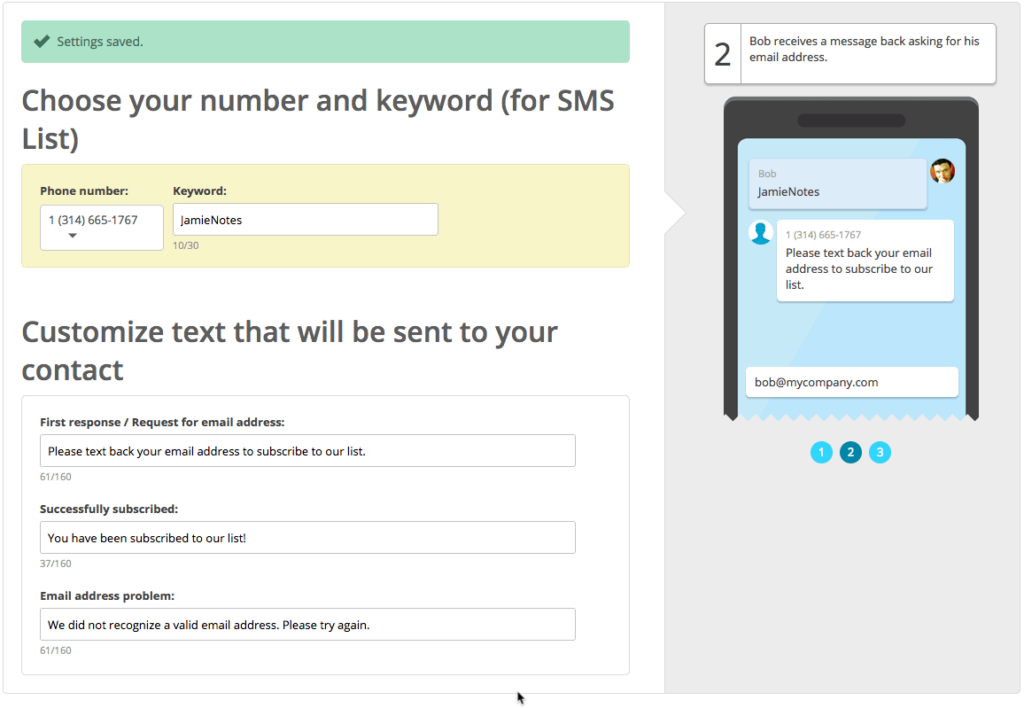
In April 2024, ActiveCampaign announced a significant update to their SMS capabilities, introducing new enhancements designed to improve the effectiveness of mobile marketing strategies.
The update includes advanced features that enhance SMS sending capabilities, allowing for more robust and efficient communication with customers. It also improves the integration of SMS with other marketing channels, ensuring that businesses can more effectively coordinate their marketing efforts across different platforms.
This means that SMS campaigns can be better aligned with email, social media, and other marketing activities, providing a cohesive experience for customers. For users, the value of this update lies in its potential to drive higher engagement and conversion rates through targeted, well-coordinated mobile marketing campaigns.
Verdict: Not! ActiveCampaign's updates this quarter were mostly smaller, quality-of-life stuff—nothing to write home about. I look forward to what might come next.
March 2024 Updates
Here are some March update highlights.
Windsor AI Update Notes
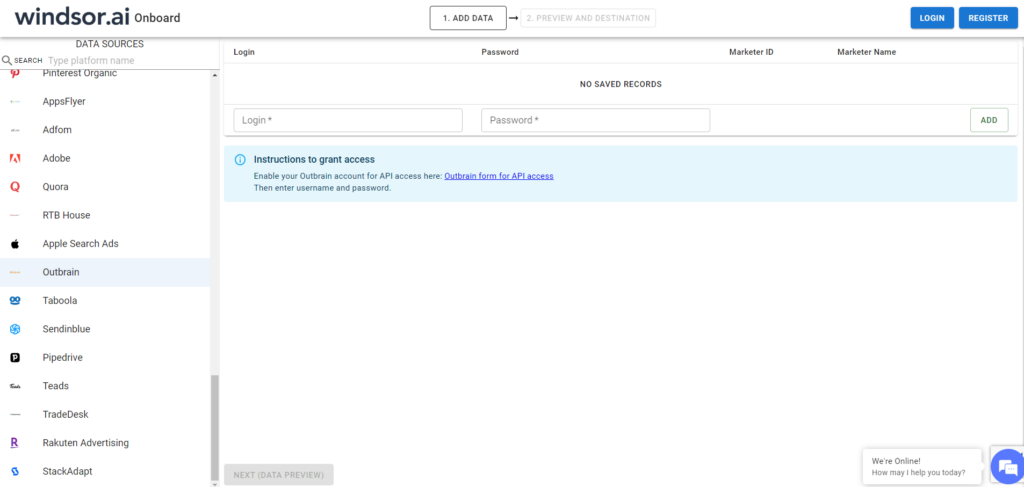
On March 4, 2024, Windsor AI rolled out a significant update to their video platform, enhancing its capabilities to distribute personalized videos at scale via email and SMS.
The update to Windsor AI's platform introduces advanced features that allow businesses to effortlessly send millions of personalized videos. This will help with optimizing customer engagement strategies by enabling the delivery of a high volume of customized video content created from a single source video.
This process ensures that each recipient receives a video message that feels personally tailored to them, whether it's through tailored offers, messages, or information, all derived from a single video template. This approach not only streamlines the communication process but also enhances the effectiveness of marketing campaigns.
Verdict: Hot! Video content is out-achieving written and static-image counterparts by a mile and a half. Being able to personalize and distribute video content at scale is huge.
AppsFlyer Update Notes
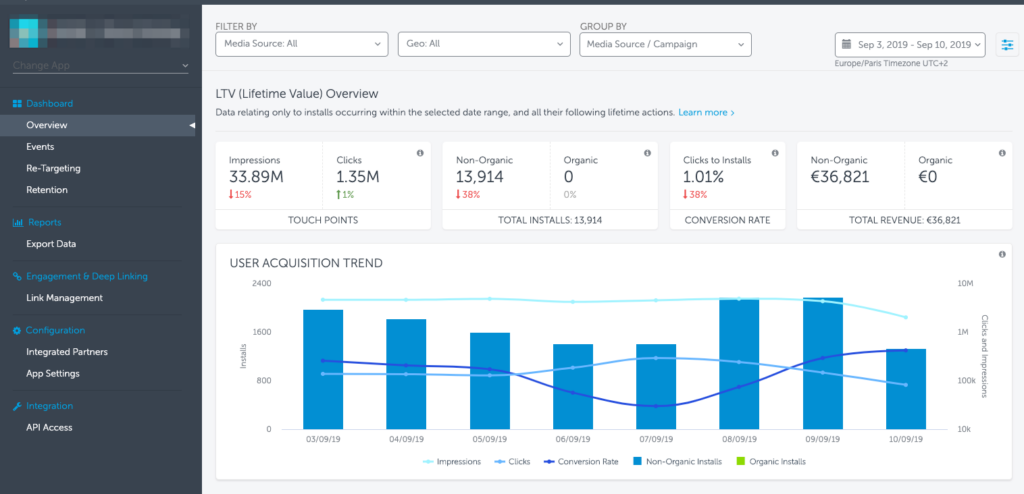
On March 21, 2024, AppsFlyer introduced a significant update to its ROI360 Advanced suite: the Unattributed Ad Revenue Postbacks feature. This enhancement is designed to provide a more comprehensive data sharing capability, specifically targeting interactions with media partners.
The Unattributed Ad Revenue Postbacks feature allows for the sharing of ad revenue data that has not been directly attributed to specific advertising sources or campaigns.
By including data on ad impressions that do not directly lead to sales but still play a role in the conversion funnel, AppsFlyer users can achieve a more accurate and comprehensive understanding of their marketing campaigns' overall performance. This way, marketers can better allocate resources to different channels by understanding the indirect contributions of various advertising elements to revenue generation.
Verdict: Hot! Unattributed marketing data can be hard to add into your monthly ROI calculations. Being able to grab this data and place it appropriately will be super helpful.
HubSpot Update Notes
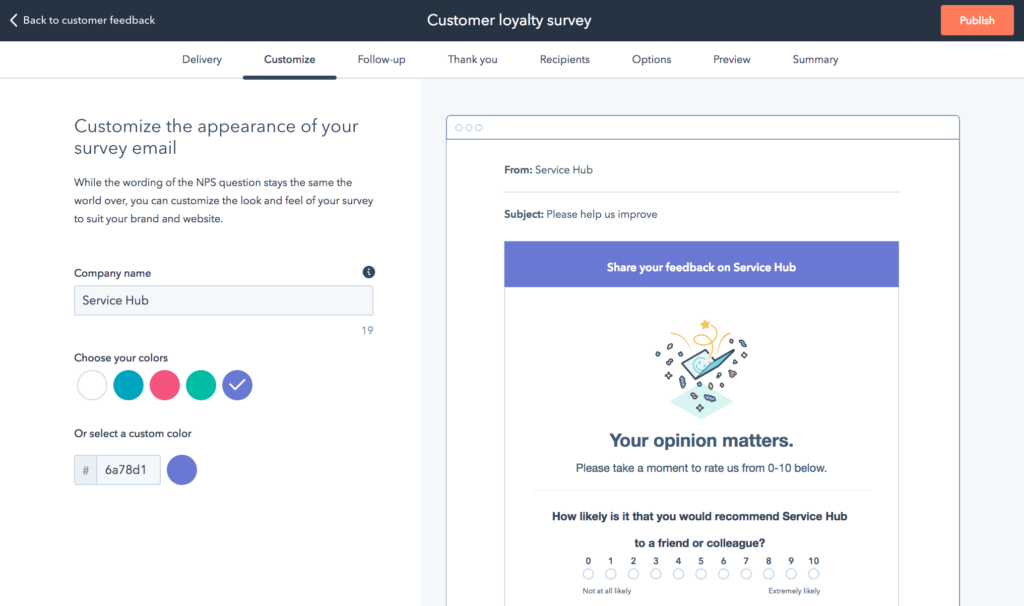
In March 2024, HubSpot introduced a significant enhancement to its Service Hub Pro+ offerings with the launch of Custom Feedback Surveys on Web. This new feature allows businesses to create and deploy customized feedback surveys directly on their websites.
The surveys are designed to be highly adaptable, enabling companies to trigger them based on specific visitor behaviors, such as the amount of time spent on a page or how far a visitor scrolls down a page. By understanding visitor behavior and preferences at a granular level, companies can make data-driven decisions to optimize their websites and marketing strategies.
By setting conditions for when the surveys appear, such as after a visitor has been on a page for a predetermined period or has scrolled through a certain percentage of the content, businesses can capture more relevant and timely insights. This targeted approach helps ensure that the feedback collected is more aligned with the visitor's experience on the site.
Verdict: Hot! Surveys are a great marketing tool but needing to source a whole new software for them can be a pain. Having feedback surveys built right into Hubspot saves time and effort.
Branch Update Notes
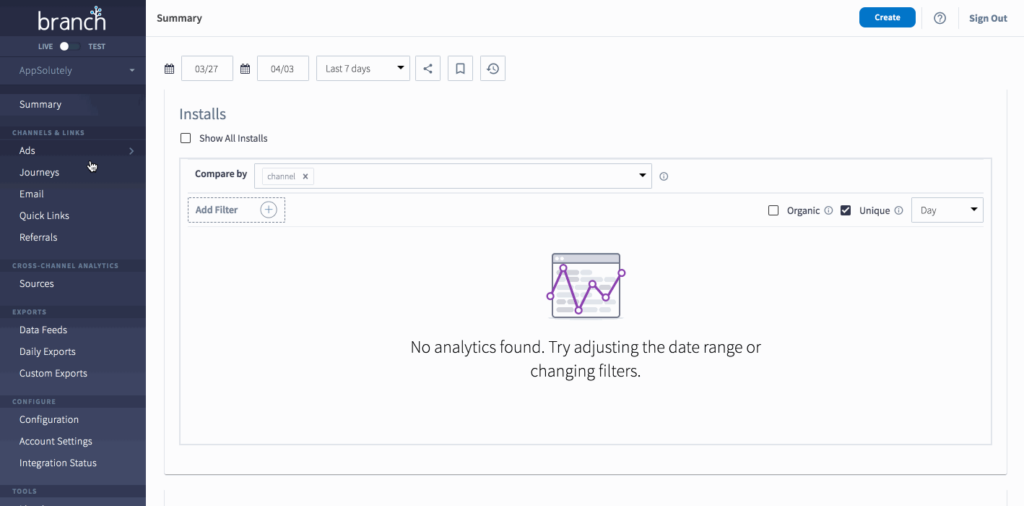
In March 2024, Branch.io announced a significant upgrade to its email marketing solutions with the introduction of Universal Email, replacing the earlier version known as Deep Linked Email.
Universal Email is designed to enhance how email campaigns integrate with mobile apps by facilitating deeper and more precise linking capabilities. With this update, marketers can now direct users from an email directly to specific locations within an app, bypassing traditional navigation hurdles.
By minimizing friction and creating a seamless transition from email to app, Branch.io helps businesses capitalize on user interest immediately, leading to higher conversion rates and enhanced customer satisfaction. This update is particularly beneficial for ecommerce and retail apps, where quick access to products and offers can directly influence buying decisions.
Verdict: Not! If your software features aren't mobile-optimized 110% by now, I don't know what to tell you. So 2010!
Oktopost Update Notes

In March 2024, Oktopost announced a significant enhancement to its platform with the expansion of social selling tools (AKA social commerce) designed to refine and amplify social selling strategies for B2B marketers. This development introduces a suite of new tools that specifically target the improvement of content creation and distribution across various social networks.
The core functionality of these newly introduced tools lies in their ability to enhance the creation and dissemination of content across social channels. By automating and optimizing several aspects of the content lifecycle, these tools help marketers efficiently manage their social media presence. This is particularly crucial for B2B companies where content plays a pivotal role in sales strategies.
Stronger social selling strategies can lead to increased efficiency in campaign management and potentially higher ROI on social selling initiatives. Marketers can expect these tools to significantly contribute to more streamlined operations and improved outcomes from their social media strategies.
Verdict: HOT! Customers increasingly expect that they can one-click your social content and be taken to the exact page, product, sale item that they want. Oktopost is ensuring that's the case!
February 2024 Updates
Here are some February update highlights.
LeadsRx Update Notes

On February 2, 2024, LeadsRx introduced a significant update to their platform, entitled "Blending AI and Multi-Touch Attribution". This update marks a pivotal integration of Artificial Intelligence (AI) and Large Language Models (LLMs) with Multi-Touch Attribution (MTA).
The focus of this enhancement is on improving the interpretation and utility of both text-based and numerical data within the marketing analytics sphere. By leveraging AI and LLMs, LeadsRx can now provide more nuanced insights into customer behaviors and interactions across various marketing channels.
The value of this update to LeadsRx users is substantial. By providing a clearer picture of customer journeys and the effectiveness of different marketing touchpoints, marketers can optimize their advertising strategies with greater confidence. This integration enables the system to dissect complex data sets, offering a more granular view of how each touchpoint influences customer decisions and conversion paths.
Verdict: HOT! AI/ML are not just buzzwords and LeadsRx is leveraging them in the way they work best: sorting, amplifying, and drawing connections between data points to save you time.
Frequently Asked Questions
Here are some answers to questions you may still have about marketing attribution software.
What are the common challenges in implementing marketing attribution software?
What are the key differences between single-touch and multi-touch attribution?
Can marketing attribution software integrate with all CRM platforms?
How does marketing attribution software impact budget allocation decisions?
Can marketing attribution software track offline marketing efforts?
What should I look for in marketing attribution software as a B2B marketing leader?
How can I measure ROI improvements after implementing attribution software?
Can attribution models be customized for long sales cycles or ABM?
Other Marketing Intelligence Software Reviews
Marketing software comes in all shapes and sizes, from social media platform management to website and product reporting. You'll probably need several tools to cover the whole gambit of needs. Here are some other software review lists that I recommend checking out:
- Affiliate Marketing Software
- Marketing Dashboard Software
- Marketing Measurement Tools
- Market Intelligence Software
- PR Analytics Tools
- Performance Marketing Platforms
- MLM Software
Conclusion
In your pursuit of a marketing attribution solution, start by examining your principal channels and the attribution models you wish to employ. Quality marketing attribution software will go beyond the constraints of single-touch attribution, helping you discern the interconnected touchpoints in your campaigns.
Don't overlook the power of a free trial — it's your opportunity to "test drive" the software. Buying a solution without experiencing its functionality would be like buying a car without giving it a test drive.
To stay informed on marketing trends and strategies, sign up for the CMO newsletter.




